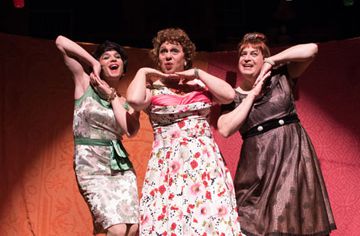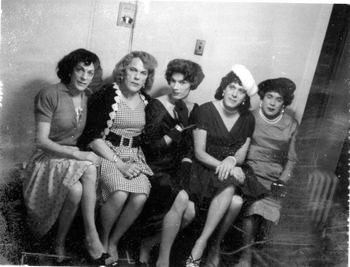Play (2014)
by Harvey Fierstein
Directed by Scott Edmiston
Speakeasy Stage Company
Boston Center for the Arts, South End, Boston
Scenic Design by Janie E. Howland; Costume Design by Gail Astrid Buckley; Original Music/Sound Design by Dewey Dellay
With Kerry A. Dowling (Rita), Greg Maraio (Jonathon/Miranda), Robert Saoud (Bessie, Thomas Derrah (George/Valentina), Will McGarrahan (Charlotte), Eddie Shields (Gloria), Sean McGuirk (Terry), Timothy Crowe (The Judge/Amy), Deb Martin (Eleanor)

Thomas Derrah as George/Valentina
Robert Saoud as Bessie
in “Casa Valentina”
Photo: Glenn Perry Photography
Courtesy of Speakeasy Stage Company
More striking than perhaps anything else about this play is that it is based in fact. Presumably there was a place in the Catskills in the early 1960s where heterosexual male transvestites could go and hang out. After a trove of photographs of the place was discovered at a flea market about ten years ago, a book about it, Casa Susanna (powerHouse, 2005) edited by Michael Hurst and Robert Swope, was published.
This play traces fourteen hours at a resort, Casa Valentina, modeled after that historic one. Many repeat visitors attend the gathering, and there is a new one who needs psychological adjustment and, as well, a fashion redo. There is also a lot of talk about heterosexuality and transvestitism, and eventually some psychological drama.
The many good actors who populate the stage in this play, among them the noted Thomas Derrah and Will McGarrahan, give it their all to create a sense of plausibility, fun, intrigue, and some degree of psychological complexity in this multifaceted invention by the well-trod playwright and actor, Harvey Fierstein. The garish get-ups are lots of fun and it’s fabulous to see this troupe pull off wonderful transitions to female alter-egos.
Were the play simpler, and just tried to portray what it might have been like to be a seemingly straight man going to dress up as a woman among other seemingly straight men who do the same, would have been plenty.
Instead, Fierstein has made this play more complex – in fact three plays in one – and the initial sense of wonder at what a place like this must have been like gets swept away with the other themes.

in the late 1950s or early 1960s
captured in Casa Susanna
After the initial introduction of the new guy, and a very entertaining scene in which the gang re-dresses him, there is a transition to what seems like a long panel discussion on the nature of transvestitism and how it’s important to declare its difference from homosexuality. What starts as a curious and entertaining view into this unlikely universe fifty years ago suddenly turns into a policy forum and the tone changes from frivolity and adventure to debate and contentiousness.
Were that the only bend in the dramatic road, the lighter tone at the outset might not necessarily have been derailed.
Somewhat strangely, Fierstein decides to go from debate to high drama in which there is a lot of the kind of soul-baring that seems oddly gratuitous given the nature of the whole setup. Without saying too much, suffice it to suggest that any serious discussion that might have taken place between the proprietors of Casa Valentina, Rita (Kerry A. Dowling) and her husband George (Thomas Derrah) who dresses up as a woman, Valentina, would likely have occurred well before any gathering such as this, much more at the outset of any such idiosyncratic domestic and commercial undertaking.
That high drama just doesn’t ring true; other major conflicts get raised and the high level of emotion that converges near the end of the play seems strangely inconsistent with the play’s overall sense and tone.
The problem may be that the play was not really Fierstein’s idea. As the story goes, the original producers, having discovered the book, Casa Susanna, commissioned Fierstein to write a play based on it. Consequently, he may have wound up working a little too hard to fulfill his commission and wound up over-dramatizing it.
That said, there are some very good performances here, and the emotion that’s generated by these good actors is sincere and well conceived.
To watch George/Valentina wrestle with his identity in the context of dealing with his business and his wife, is at once touching, revealing and heartbreaking. And the same might well be said of other portrayals in the piece. A lighter touch on Fierstein’s part, however, would have been welcome. There is poignancy and oddity enough in the motivating story to have given it dramatic texture. Adding the polemics and the oddly heightened drama serves to distract from the powerful center of the story.
The set by Janie E. Howland is textured and captivating, and the costumes by Gail Astrid Buckley (this must have been a fun job) are, by and large, hilariously and wildly garish, though the get-up for Eddie Shields’ Gloria is remarkably sleek and stylish.
– BADMan
Leave a Reply